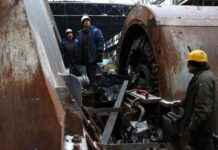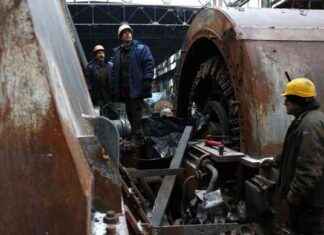At 34, he could soon be one of the teachers and students who have chosen to leave following these changes.
According to the latest figures, more than 4,000 Hong Kong teachers left their jobs in the past school year, up 70 percent from the previous year.
“They don’t have any faith in the future of Hong Kong or the future of the (education) sector. It’s hard to raise someone in that environment,” Wong told AFP. wished to give only his surname.
The political repression coincided with the coronavirus pandemic which has cut off the territory from the rest of the world for more than two years due to a draconian health policy in line with China’s “zero-Covid” strategy, which has generated many departures.
Primary and secondary schools had registered some 30,000 fewer students in September 2021 compared to the previous October.
Mr Wong, a teacher for more than a decade, says that in his class of 32 teenagers, five left school to follow their families and move abroad.
“They don’t leave because they don’t like school, but because of the context in Hong Kong,” he says.
– Patriotism –
It is in its image that China is reshaping the city where, for a long time, dissent and political pluralism have been tolerated.
Professors have been ordered to instill patriotism and abide by the national security law imposed in 2020 by Beijing to stifle dissent.
Educational programs have been changed to be in line with the Chinese Communist Party’s ideology.
In early August, kindergarten through high school teachers were ordered to “study and learn the main messages” from a recent speech by Chinese President Xi Jinping.
Students and parents have also been encouraged to report teachers who may violate the safety law.
Mr Wong received a warning from the Ministry of Education in 2021 following anonymous reports about a class on civil disobedience.
“It destroyed the confidence that is fundamental to teaching,” he regrets.
Between 2019 and 2021, city authorities received 344 complaints against professors in relation to the huge pro-democracy protests of 2019. Some 55% of the cases were considered founded.
The principal of a high school told AFP that he had asked staff to keep a low profile and strictly follow government directives.
“Everyone is very careful … if (a subject) is politically sensitive, then we bypass it,” admitted the director, who requested anonymity.
The authorities reject the idea of a wave of migration and argue that various reasons have led teachers to leave their posts, citing in particular retirements.
According to the Minister of Education, the schools are generally functioning well and there are enough qualified teachers to compensate for a “slightly higher” departure rate.
A recent survey of 140 schools shows that each school has lost an average of 32 students and seven teachers over the past year.
Local newspaper Ming Pao scoured its classifieds and found that at least 200 schools were still looking for teachers at the end of July, while in previous years most vacancies had been filled by the end of May.
Administrators say some schools are forced to hire less qualified people.
Education is far from the only sector affected by the brain drain. The city’s labor force has fallen about 6% since 2018 to 3.75 million people, according to the latest official figures, the lowest figure in nearly a decade.
The new generation of teachers are now weighing the pros and cons, like Mak, 23, a college graduate who spent a year teaching English at a secondary school without having a teacher’s qualification.
“I will continue to teach but not necessarily in the long term,” he added.
Mak feels he has little control over the evolution of his profession: “Either you submit or you resign”, he sighs.








